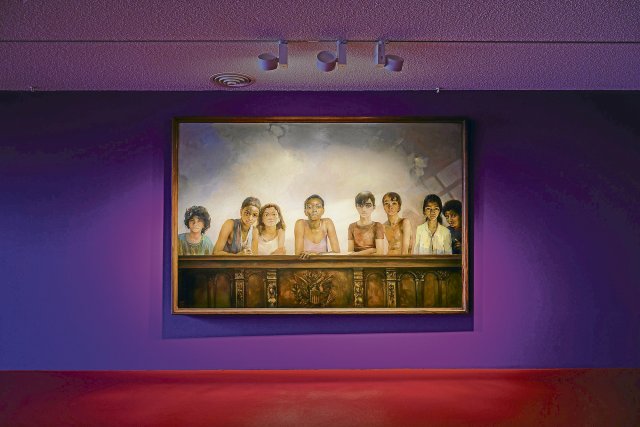Vision or illusion of anti-imperialist solidarity? A question that the HKW in Berlin is currently asking itself.
Photo: Hannes Wiedemann/HKW
The history of the GDR’s international relations is a chapter that is probably often deliberately ignored in current historiography, which likes to present itself smugly under the title of “coming to terms with injustice.” The GDR was in a good position in terms of foreign policy; its reputation, especially in Africa, was high, but that of the Federal Republic was not so high. This does not fit into the current self-image of this society. It was therefore exciting to see how critically the House of World Cultures approached this topic.
The director Bonaventure Soh Bejeng Ndikung curated the exhibition “Echoes of the Brother Countries”. Is there a blank space filled with content? After all, at the end of the GDR era, almost 200,000 foreigners lived in the small GDR, including many contract workers from Cuba, Vietnam, Mozambique and Angola. As early as the 1960s, skilled workers were recruited from countries such as Hungary and Bulgaria. The director’s father Dimiter Gotscheff came to the GDR as a veterinarian, Heiner Müller’s temporary partner Ginka Tscholakowa was Bulgarian, and City initially had two Bulgarians in the band. It quickly became more international. In the cultural sector this was seen as a beneficial opening.
As a scientist, my father traveled to Cuba, Sudan or Mozambique for a few weeks every year on agricultural projects. Such encounters resulted in friendships that often lasted a lifetime. They broadened the horizons of those involved; everyone was united in the anti-colonial spirit. When the Portuguese left Mozambique and Angola in particular, they left behind a desert that made it difficult for people to survive.
The internationalist aspect of education went far. My father alone had a total of over 20 doctoral students from Africa, and of course foreigners were also included in my philosophy studies at Humboldt University. People saw each other as an enrichment – and not just when it came to cooking. There are many stories to tell that are part of lived history. There are also a number of serious publications about this, such as »We have left traces! The GDR in Mozambique” (Matthias Voß, ed.) and “‘It’s about our existence’. The GDR’s policy towards the Third World using the example of Mozambique and Ethiopia” by Hans-Jürgen Döring.
Of course, such encounters were not without conflicts, but overall the experience-hungry GDR citizens were curious about everything that came to them from the world. Does the exhibition take up this aspect of lived understanding? No,
